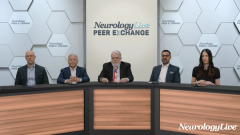
Treatment Adherence in MG
Experts in neurology discuss how to ensure disease progression in not due to poor adherence to treatment in MG, emphasizing educating the patient about their disease.
Episodes in this series

This is a video synopsis/summary of a panel discussion involving James Howard, MD; Nicholas Silvestri, MD, FAAN; Tuan Vu, MD; Ali Habib, MD; and Beth Stein, MD.
Ensuring patient adherence to treatment, particularly with subcutaneous injections, presents a challenge, especially in conditions like diabetes where noncompliance rates can reach 30%. Symptoms often drive compliance, especially when patients experience fluctuating weakness or vision issues. While adherence may wane during remission, understanding individual patient barriers like route of administration or side effects is crucial.
Communication and education are key, with continuous dialogue to tailor treatment plans and address patient concerns. Access to reliable resources, such as the Myasthenia Gravis Foundation of American (MGFA) website, aids in patient education. However, navigating misinformation from sources like social media is vital. Myasthenic crisis risk, defined by the need for ventilatory support, is highest among those with suboptimal control, especially early in the disease course or during exacerbating factors like infections or medication changes. Weather conditions, like heat and humidity, can exacerbate symptoms.
Common triggers for crisis include antibiotics, new cancer therapeutics, and abrupt changes in prednisone dosage. Certain medications, like azithromycin and ophthalmic drops containing beta-blockers, can swiftly escalate symptoms, underscoring the importance of careful medication management. Overall, tailored education and open communication are essential in ensuring patient adherence and preventing myasthenic crises.
Video synopsis is AI-generated and reviewed by NeurologyLive editorial staff.
Newsletter
Keep your finger on the pulse of neurology—subscribe to NeurologyLive for expert interviews, new data, and breakthrough treatment updates.














